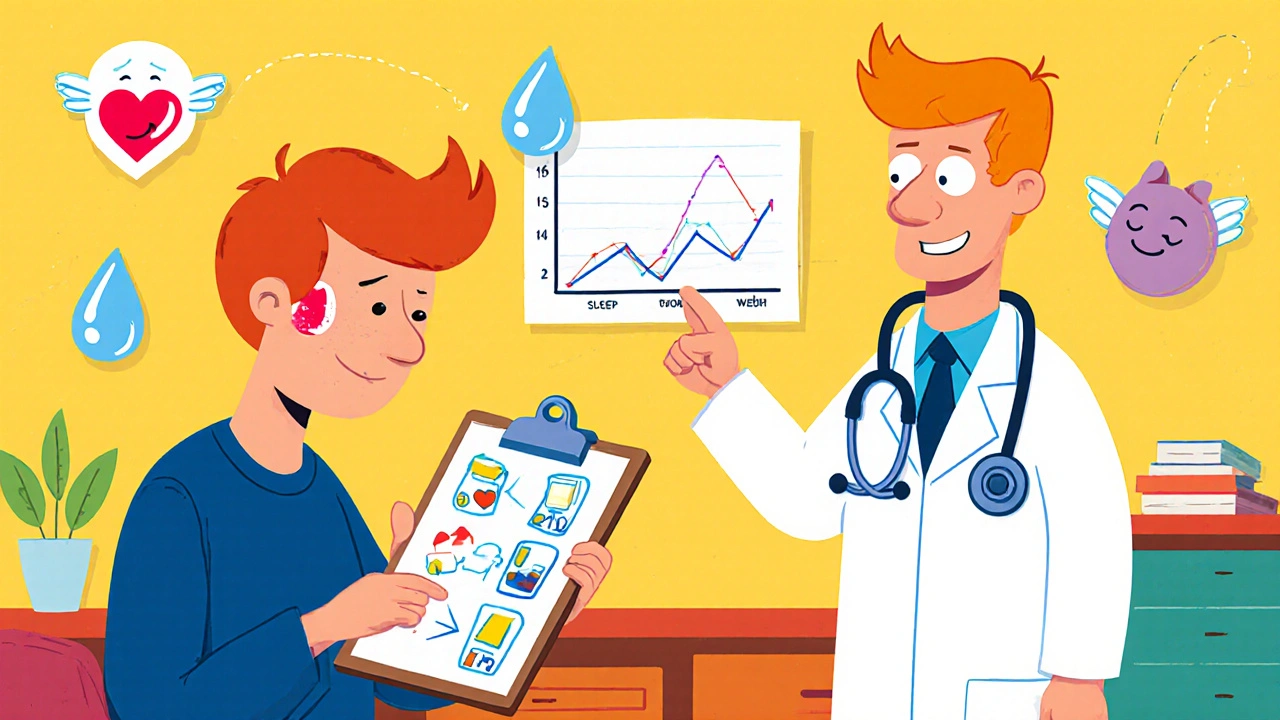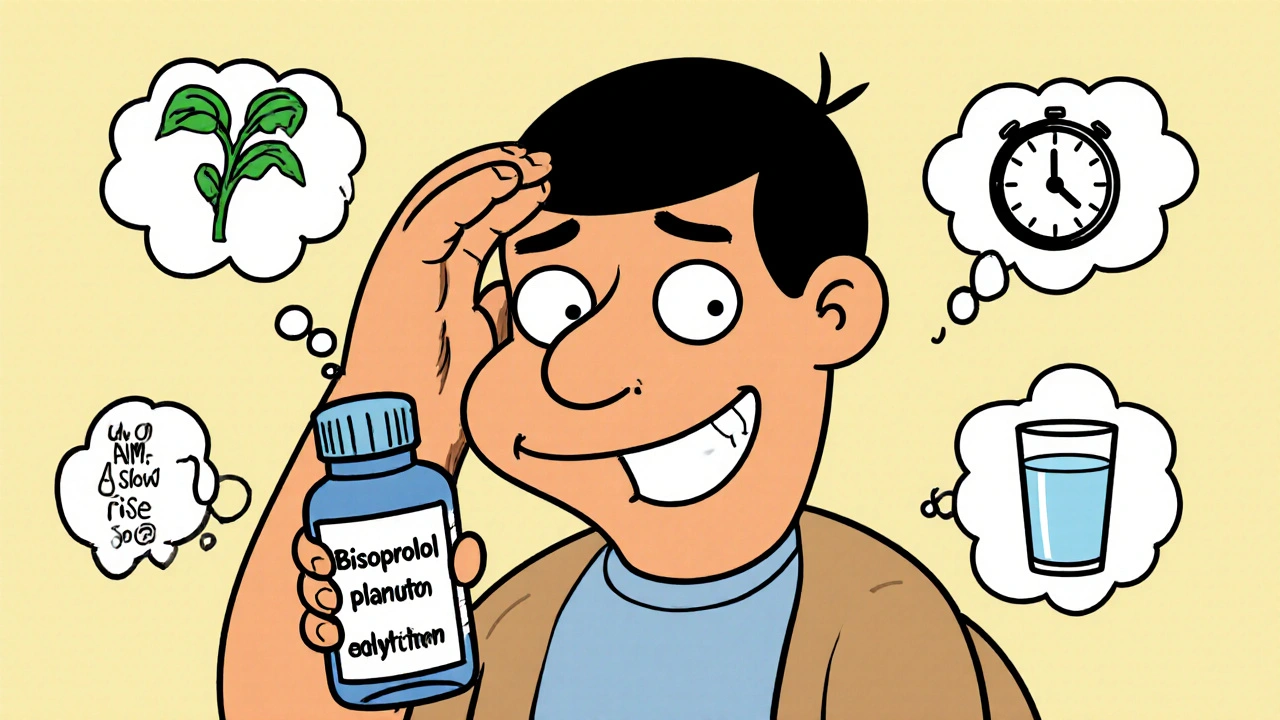If you’ve started taking bisoprolol fumarate and now get frequent headaches, you’re not alone. It’s one of the more common side effects, especially in the first few weeks. Many people assume it’s just stress or dehydration - but if your headaches started right after you began the medication, bisoprolol could be the culprit. The good news? Most of these headaches ease up on their own. But if they don’t, or if they’re severe, you need to know how to handle them safely.
Why Bisoprolol Fumarate Causes Headaches
Bisoprolol fumarate is a beta-blocker used to treat high blood pressure, angina, and certain heart rhythm problems. It works by slowing your heart rate and reducing the force of each heartbeat. That’s great for your heart - but it also lowers blood pressure more than your body expects, especially at first.
This sudden drop in blood pressure can reduce blood flow to the brain temporarily. Your brain senses this change and triggers a headache. It’s not a migraine in the traditional sense - it’s more like a dull, steady pressure behind the eyes or across the forehead. Some people describe it as a tight band around the head.
Studies show that up to 12% of people taking bisoprolol report headaches during the first month of treatment. The risk is highest when starting the medication or when the dose is increased. Once your body adjusts - usually within 2 to 6 weeks - the headaches often fade.
When to Worry About the Headache
Not all headaches from bisoprolol are harmless. You should call your doctor if:
- The headache is sudden, severe, or unlike any you’ve had before
- You feel dizzy, confused, or have blurred vision along with the pain
- The headache wakes you up at night or gets worse when you lie down
- You develop neck stiffness, fever, or sensitivity to light
These could signal something more serious - like low blood pressure that’s too extreme, a rebound effect, or even a rare condition like reversible cerebral vasoconstriction syndrome (RCVS). While rare, it’s better to rule it out.
Also, if your headache lasts longer than 6 weeks or gets worse over time, don’t assume it’s just "adjusting." That’s a sign your body isn’t adapting, and your dose may need to be reevaluated.
What You Can Do Right Now
Here are practical, evidence-backed steps to reduce bisoprolol-related headaches without stopping the medication:
- Stay hydrated. Dehydration makes low blood pressure worse. Drink at least 1.5 to 2 liters of water daily. Avoid excessive caffeine - it can cause rebound headaches when it wears off.
- Get up slowly. Standing too fast after sitting or lying down can cause a sudden drop in blood pressure. Pause for 10 seconds before standing. Sit on the edge of the bed for a moment before getting up.
- Avoid alcohol. Alcohol lowers blood pressure further and can intensify headaches. Even one drink can make symptoms worse.
- Don’t skip meals. Low blood sugar can mimic or worsen headache symptoms. Eat small, balanced meals every 3 to 4 hours. Include protein and complex carbs - like oatmeal with nuts or yogurt with fruit.
- Try gentle exercise. Light walking or stretching improves circulation and helps your body adapt to lower blood pressure. Avoid intense workouts until your body adjusts.
These steps aren’t just common sense - they’re backed by clinical guidelines from the American Heart Association and the European Society of Hypertension. Simple changes like these reduce headache frequency in over 60% of patients within two weeks.

Over-the-Counter Pain Relief: Safe Options
You can take acetaminophen (paracetamol) for occasional headaches. It doesn’t interfere with bisoprolol and is gentle on the stomach. Stick to the lowest effective dose - no more than 3,000 mg per day.
Avoid NSAIDs like ibuprofen or naproxen unless your doctor says it’s okay. These can raise blood pressure and counteract bisoprolol’s benefits. They also increase the risk of kidney issues, especially in people with existing heart conditions.
Some people turn to caffeine pills or Excedrin for quick relief. But caffeine is a double-edged sword. It can help temporarily by constricting blood vessels - but if you use it daily, you risk rebound headaches. Use it no more than twice a week.
When to Talk to Your Doctor About Dose Changes
If headaches persist beyond six weeks despite lifestyle changes, it’s time to revisit your treatment plan. Don’t stop bisoprolol on your own - that can cause rebound high blood pressure or heart palpitations.
Your doctor may:
- Lower your dose temporarily, then gradually increase it again
- Switch you to another beta-blocker like metoprolol succinate, which some patients tolerate better
- Add a low-dose calcium channel blocker to help stabilize blood pressure
- Check for other causes like sleep apnea, which can worsen both headaches and hypertension
A 2023 study in the Journal of Clinical Hypertension found that patients who had persistent headaches on bisoprolol were 3 times more likely to benefit from a switch to metoprolol than from a dose reduction alone. The reason? Metoprolol has a slightly different effect on cerebral blood flow.

Long-Term Outlook
For most people, bisoprolol headaches are temporary. About 80% of patients report complete resolution within 8 weeks. The body adapts to the lower heart rate and blood pressure. Your brain’s blood vessels adjust, and the signals that trigger headaches fade.
But if you’ve been on bisoprolol for months and the headaches are still there - especially if they’re getting worse - it’s not normal. You might have an underlying issue like chronic tension headaches triggered by stress, or even medication-overuse headaches from relying too much on painkillers.
Keep a simple headache diary: note the day, time, intensity (1 to 10), what you ate or drank, your sleep, and whether you took bisoprolol that morning. This helps your doctor spot patterns. Is the headache worse after a poor night’s sleep? After skipping breakfast? After taking your pill on an empty stomach?
What Not to Do
Here are three common mistakes people make:
- Stopping bisoprolol cold turkey. This can cause a spike in heart rate and blood pressure - sometimes dangerously high. Always taper under medical supervision.
- Self-prescribing supplements. Magnesium, riboflavin, or coenzyme Q10 are sometimes used for migraines, but they haven’t been proven for bisoprolol-induced headaches. Some can interact with heart meds.
- Ignoring other symptoms. If you also have fatigue, cold hands, or shortness of breath, your dose might be too high. Headaches are often the first warning sign.
Final Thoughts
Bisoprolol fumarate saves lives. But like all medications, it comes with trade-offs. Headaches are usually a temporary nuisance - not a reason to quit. Most people get through them with simple adjustments: hydration, slow movements, regular meals, and avoiding alcohol.
If you’re still struggling after a month, talk to your doctor. There’s no shame in needing a tweak. Your goal isn’t to endure side effects - it’s to manage your heart health without sacrificing your quality of life.
Headaches from bisoprolol don’t mean the drug isn’t working. They just mean your body needs a little help adjusting. With the right approach, you can keep taking it - and feel better doing it.
Can bisoprolol fumarate cause migraines?
Bisoprolol fumarate doesn’t typically cause classic migraines with aura, light sensitivity, or nausea. Instead, it causes tension-type headaches - dull, constant pressure, often in the forehead or back of the head. These are related to blood pressure changes, not neurological triggers. However, people who already get migraines may find their attacks become more frequent when starting bisoprolol. If you have a history of migraines, tell your doctor before starting the medication.
How long do bisoprolol headaches last?
For most people, headaches from bisoprolol last 2 to 6 weeks. They usually peak in the first 10 days and then gradually improve. If they continue beyond 8 weeks, it’s unlikely they’re just from the medication adjusting. At that point, your doctor should check your dose, rule out other causes like sleep apnea or dehydration, or consider switching medications.
Can I take ibuprofen with bisoprolol for headaches?
It’s not recommended. Ibuprofen and other NSAIDs can raise blood pressure and reduce the effectiveness of bisoprolol. They also increase the risk of kidney problems, especially in people with heart disease. Acetaminophen (paracetamol) is a safer choice for occasional headaches. Always check with your doctor before taking any new medication, even over-the-counter ones.
Does taking bisoprolol with food help reduce headaches?
Yes. Taking bisoprolol with a light meal can slow its absorption, which helps prevent sudden drops in blood pressure. This reduces the chance of headaches triggered by rapid changes. Avoid taking it on an empty stomach, especially in the morning. A small snack like toast or yogurt before your pill can make a noticeable difference.
Is it safe to stop bisoprolol if headaches are too bad?
No. Stopping bisoprolol suddenly can cause rebound high blood pressure, rapid heart rate, chest pain, or even a heart attack. Always talk to your doctor first. They can help you taper off slowly or switch to a different medication. Your heart condition is more important than temporary headaches - but that doesn’t mean you have to live with them. There are safer solutions.
If you’ve been struggling with headaches since starting bisoprolol, you’re not stuck with them. With the right adjustments and guidance, most people find relief - and keep the heart protection they need.


Comments (8)
Andrea Gracis
29 Oct, 2025i started bisoprolol last month and my head felt like a balloon being slowly inflated 😅 i thought it was just stress but then i read this and was like... ohhh. i’ve been chugging water like it’s my job and honestly? way better. still a little fuzzy in the a.m. but no more pounding.
Matthew Wilson Thorne
29 Oct, 2025Acetaminophen. Not NSAIDs. Basic pharmacology.
April Liu
31 Oct, 2025Heyyy I’ve been there!! 💪 Just wanna say - you’re not crazy, and you’re not alone. The slow stand thing? Game changer. I used to bolt up from my couch and feel like I was gonna pass out. Now I sit for 15 seconds, wiggle my toes, then go. Also, eating a banana with my pill? Magic. No more 10/10 head pressure. You got this!! 🌞
Emily Gibson
1 Nov, 2025It’s so easy to blame yourself when you feel off after starting a new med. But this isn’t weakness - it’s your body learning a new rhythm. I’ve helped dozens of patients adjust to beta-blockers, and the ones who survive the first month with hydration, meals, and patience? They end up feeling better than ever. You’re not broken. You’re adapting.
Mirian Ramirez
3 Nov, 2025soo i’ve been on this stuff for 3 months and still get headaches like every other day?? i thought it was just me being lazy or not drinkin enough but like... i drink like 3 liters a day and eat every 3 hours and still... ugh. i’m gonna ask my doc about metoprolol cause i read somewhere it’s gentler on the head?? also i started takin my pill with a spoon of peanut butter and it helped a lil?? idk if that’s science or just placebo but i’ll take it 🤷♀️
Herbert Lui
4 Nov, 2025Headaches aren’t just symptoms. They’re the body’s quiet rebellion against speed. Bisoprolol doesn’t just slow your heart - it slows your entire rhythm. And your brain? It’s screaming, "Wait, we were going 70, now we’re going 30? Are we lost?" The pain is the echo of adaptation. Most people just want the noise to stop. But maybe... just maybe... the noise is the map. Listen to it. Don’t silence it. Adjust. Don’t abandon.
Nick Zararis
4 Nov, 2025Hydration. Slow movements. No alcohol. No NSAIDs. Eat regularly. Keep a diary. Don’t stop cold turkey. Talk to your doctor. These are not suggestions. These are non-negotiables. Do them. Your heart will thank you. Your head will thank you. And your future self? Will be so glad you didn’t wing it.
Sara Mörtsell
5 Nov, 2025Wow. So much advice. So much... caution. But here’s the truth: if your doctor prescribed this, they think the benefit outweighs the headache. And they’re right. You don’t get to decide what your heart needs. You get to follow the plan. So drink your water. Eat your banana. Take your pill. And stop treating this like a personal failure. It’s medicine. It’s not supposed to feel perfect. It’s supposed to save you. End of story.